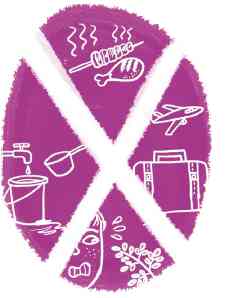CEBU CITY—One of the superstitions linked to Good Friday and Black Saturday is one that says it’s bad luck to travel on those days.
Suzette Mae Pacilan, 26, of Daanbantayan town, northern Cebu, grew up believing this.
Suzette had feared meeting an accident if she ignored the superstition, which had been passed on by her mother from her grandparents.
Suzette continued to believe in the superstition, though, despite the absence of a scientific basis for it.
“We lose nothing if we follow it,” said Suzette, now mother to a two-year-old girl.
The superstition about travel also warned of suffering from wounds on Good Friday and Black Saturday. The wounds would take longer to heal, “usually a year,” if these were suffered on those days, according to the superstition, because Jesus Christ has not risen from death and prayers for healing won’t be answered.
Suzette’s family also doesn’t eat grilled food on Good Friday because of a superstition that if they did, freckles would grow on their faces. Moringa leaves are particularly avoided because they are believed to be the chief cause of freckles if they were eaten on a Good Friday.
Fish is the main staple for Suzette’s family on Good Friday as they practice abstinence from meat.
The family often partakes of “utan bisaya,” a dish of boiled vegetables, during the abstinence period.
Like most Cebuano families, Suzette’s would have their fill of two favorite Cebuano delicacies — biko and benignit.
Biko is sweetened glutinous rice cooked in coconut milk and brown sugar while benignit is a mix of different tubers like taro, purple yam and sweet potato, ripe bananas, jack fruit, sago, tapioca pearls and sugar mixed with coconut milk and ground glutinous rice.
These delicacies are the staple in Cebuano households every Holy Week and are used to break Good Friday’s fast.
But another superstition that many Cebuanos still believe in is one which discourages taking a shower on Good Friday out of respect for the Dead Christ.
“It is not good to take a bath on Good Friday because when you die, water comes out of your body,” said 71-year-old Dal Arceo, of Barangay Pulangbato, Cebu City.
Work is also discouraged on Maundy Thursday and Good Friday because people need to devote their time to reflecting on the Passion of Christ.
Zona Hildegarde Amper, vice president of the group Ugnayang Pang-Agham Tao, said these beliefs date back to the arrival of Spanish colonizers in the 1500s and introduction of Christianity to natives.
